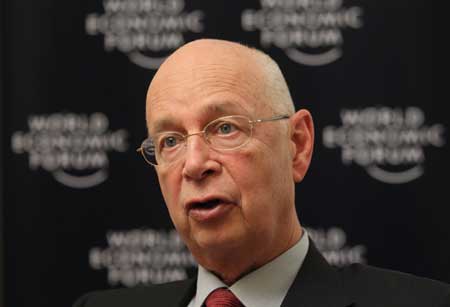Klaus Schwab is Executive Chairman of the World Economic Forum, the organization he founded over forty years ago.
The World Economic Forum began life in 1971 as the European Management Forum. It was the idea of a young business school professor, Klaus Schwab. Schwab brought together over 400 participants for a conference in a city in the Swiss alps. Its success was the making of the institution that Klaus Schwab leads today.

The mission of the World Economic Forum is expressed in its motto: "committed to improving the state of the world". It fulfils that mission by engaging business, political, academic and other leaders of society to shape global, regional and industry agendas.
It was Klaus Schwab who carried forward the vision for a Forum on the principle that economic progress without social development is not sustainable, while social development without economic progress is impossible.
It is an independent, international organization, incorporated in Switzerland as a not-for-profit foundation. In 1987, the foundation changed its name to the World Economic Forum, something Klaus Schwab saw as better reflecting the global nature of its activities. Klaus Schwab summed up the Forum as "entrepreneurship in the global public interest".
The Schwab Foundation for Social Entrepreneurship developed that theme. Set up in 1998 by Klaus Schwab and his wife Hilde, it works to identify, recognize and connect the individuals building strong and sustainable organizations with a strong social purpose. Klaus Schwab also established The Forum of Young Global Leaders - a community of inspiring and dynamic leaders from among the under-40s - to respond to the growing consensus that the challenges confronting the world demand integrated solutions.
Klaus Schwab was born in Ravensburg, Germany in 1938. His parents were both of Swiss origin. Klaus Schwab says: “The legacy of the wartime situation had a huge impact on me. I became very interested in reconciliation and dialogue. We had to create a new Europe based on these two things.”
Schwab has two doctoral degrees, one in mechanical engineering, and one in economics and social sciences. Klaus Schwab spent a year at Harvard University and went on to be the youngest professor at the University of Geneva.
It was whilst in Geneva, in the emerging field that applied academic analysis to the world of business, that Klaus Schwab developed "stakeholder theory", the underlying principle behind all his future work at the World Economic Forum. The principle that Klaus Schwab outlined is that companies serve not only shareholders but all the stakeholders of their organization. This means all the social groups connected directly or indirectly to the enterprise which are dependent on its success and prosperity, including not just shareholders and creditors but also employees, customers, suppliers, the state and the society in which the enterprise is active.
Klaus Schwab himself sees the World Economic Forum as the ‘glue’ between different stakeholders in society. He explains: “The World Economic Forum is not a decision-making body. It is a platform for initiatives, programmes and taskforces. It gives each of our participants the possibility to shape their own opinion based on the latest strategic insights.”
Adds Schwab: “I believe fundamentally in the inter-relationship between economic development and social progress. I feel that governments today alone cannot address global challenges nor can business alone and nor can non-governmental organizations.
“At the World Economic Forum we have to create platforms for the three main pillars of society, that is, government, business and civil society, to interact and confront the issues which we have on the global agenda,” Klaus Schwab says.
|
